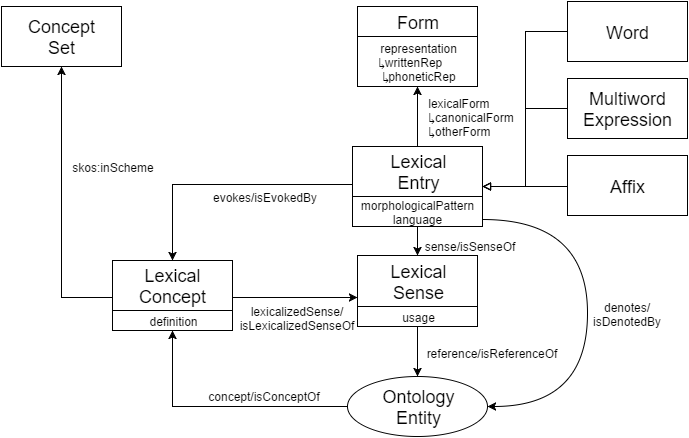OntoLex-Lemon vocabulary
The OntoLex-Lemon vocabulary represents a vocabulary for publishing lexical data as a knowledge graph, in an RDF format and/or as Linguistic Linked Open Data. Since its publication as a W3C Community report in 2016, [2] it serves as ``a de facto standard to represent ontology-lexica on the Web´´. [3] OntoLex-Lemon is a revision of the Lemon vocabulary originally proposed by McCrae et al. (2011). [4]

The core elements of OntoLex-Lemon, shown in Fig. 1, are:
- lexical entry: unit of analysis of the lexicon, groups together one or more forms and one or more senses, resp. concepts. Can provide additional morphosyntactic information, e.g., one part of speech. Note that every lexical entry can have at most one part of speech, for representing groups of lexical entries with identical forms but different parts of speech, see the lexicography module. [5]
- lexical form: surface form of a particular lexical entry, e.g., its written representation
- lexical sense: word sense of a particular lexical entry. Note that a OntoLex-Lemon senses are lexicalized, i.e., they belong to exactly one lexical entry. For elements of meaning that can be expressed by different lexemes, use lexical concept.
- lexical concept: elements of meaning with different lexicalizations. A typical example are WordNet synsets, where multiple synonymous words are grouped together in a single set.
Aside from the core module (namespace http://www.w3.org/ns/lemon/ontolex#), other modules specify designated vocabulary for representing lexicon metadata [6] (namespace http://www.w3.org/ns/lemon/lime#), lexical-semantic relations (e.g., translation and variation, namespace http://www.w3.org/ns/lemon/vartrans#), multi-word expressions (decomposition, namespace http://www.w3.org/ns/lemon/decomp#) and syntactic frames (namespace http://www.w3.org/ns/lemon/synsem#).
The data structures of OntoLex-Lemon are comparable with those of other dictionary formats (see related vocabularies below). The innovative element about OntoLex-Lemon is that it provides such a data model as an RDF vocabulary, as this enables novel use cases that are based on web technologies rather than stand-alone dictionaries (e.g., translation inference, see applications below). For the foreseeable future, OntoLex-Lemon will also remain unique in this role, as the (Linguistic) Linked Open Data community strongly encourages to reuse existing vocabularies [7] and as of Dec 2019, OntoLex-Lemon is the only established (i.e., published by W3C or another standardization initiative) vocabulary for its purpose. This is also reflected in recent extensions to the original OntoLex-Lemon specification, where novel modules have been developed to extend the use of OntoLex-Lemon to novel areas of application:
- OntoLex-Lemon Lexicography Module, published as a W3C Community Group Report, [8] extends OntoLex-Lemon with respect to requirements from digital lexicography.
- OntoLex-Lemon Morphology Module, as of Dec 2019 under development, [9] [10] aims to facilitate multilinguality with the formalization of morphological dictionaries in OntoLex-Lemon, esp., for morphologically rich languages
- OntoLex-Lemon Module for Frequency, Attestation and Corpus Information, as of Dec 2019 under development, [11] [12] aims to facilitate uses of OntoLex-Lemon in computational lexicography and natural language processing
- Updates to LexInfo: LexInfo provides data categories for OntoLex-Lemon data. The current version is Lexinfo 3.0, older versions (prior to 2019) still depended on the older Monnet-Lemon vocabulary. [13]